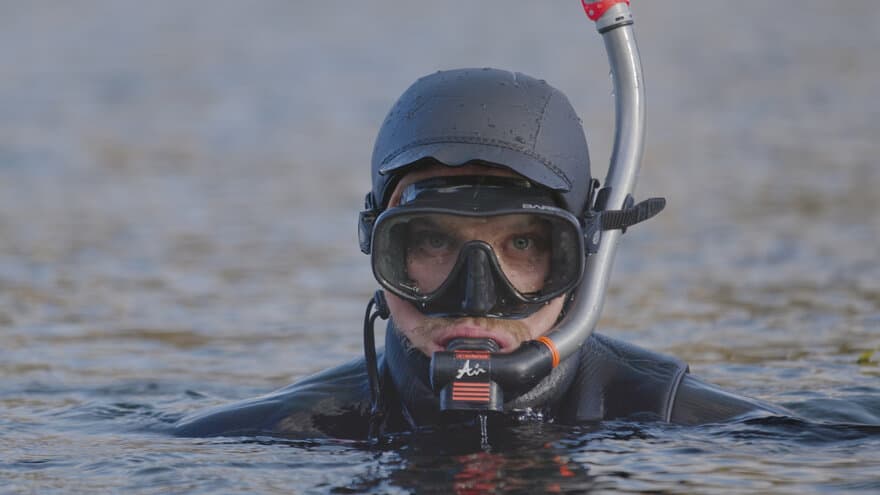Alexander Ugland identifies as a man of the sea. Three years after completing his master's in innovation and entrepreneurship at NMBU, he has secured his dream position at Bellona.
Alexander is already in his wetsuit. Even though the temperature hovers around zero degrees, he jumps into the Oslo Fjord with a big smile on his face, accompanied by his colleague Michele Legernes. Together, they will assess the condition of Marea's sea squirt hotel.
Sea squirts stand as one of the ocean's remarkable natural cleaners. These creatures filter algae, particles, bacteria, and microorganisms in one end, releasing fresh seawater from the other.
Biomarine Innovation and Intrapreneurship
Alexander has extensively explored boats and water, engaging in activities like surfing, free diving, fishing, and relishing life beneath the ocean surface.
His passion for the sea has grown in tandem with strengthened expertise. After completing a bachelor's in biomarine innovation at NTNU, he continued to NMBU for a master's in innovation and entrepreneurship.
"NMBU facilitated the opportunity for me to further cultivate my interest in biomarine resources."
Alexander Ugland.
Alexander was the only one in his class who chose to pursue innovation and entrepreneurship, or intrapreneurship, which was the main driver behind his choice.
"In this program, I could focus more on intrapreneurship, exploring how employees in a company can develop new products and services that contribute to growth and increased profitability," he explains.

Studies and student life at NMBU get a perfect 10
As a student, he quickly became involved in student associations and projects in the innovation lab, spending a lot of time in the university's fishery barn.
"The study program and student life at NMBU get a perfect 10! I knew that NMBU had a good reputation and a large, vibrant bioscience community, but it actually exceeded all expectations," praises Alexander.
After his studies, he landed a sales job as a business developer in aquaculture, a job where he learned a lot but...
"As someone straight out of the environmental university, I wanted to work sustainably and had a burning desire to contribute to the major environmental challenges and societal problems we face."
Alexander Ugland.
Roadmap for the use of bioresources under pressure
When he became aware of the job at the environmental foundation Bellona, he did not hesitate with his application.
During the interview, his strong commitment and level of knowledge were noted, and he got the position as project manager in the bioeconomy department.
"Overall, I work with sustainable biomass, including how we can achieve sustainable aquaculture by 2030. I also work on determining what salmon will eat by 2050. We've gathered many industry players and research environments and developed a roadmap for sustainable feed by 2050."
The roadmap Alexander is helping to develop also addresses which bioresources should be used where.
"As we move towards a more sustainable world, the demand for bioresources is increasing. There will be competition for them. We need established frameworks and a hierarchy that dictates how bioresources should be prioritized."
Alexander Ugland.

Bioeconomic revolution
Beneath the sea surface, the water is full of micro-particles, making visibility poor. Limited light penetrates the seabed, stifling marine life. Recent heavy rain has taken its toll on most sea squirts. This is part of a natural process.
The murky water fails to dampen Alexander's enthusiasm for free diving.
"It highlights the importance of implementing good measures," he smiles as he comes back up with a piece of garbage he found at the sea bottom.
Like many of his friends, Ugland has worked in fish farming. The aquaculture industry is an industry he wants to influence.
"I want to make aquaculture a sustainable industry. I also want to contribute to making the right decisions in the transition, or call it the bioeconomic revolution, that society is going through now," says Alexander, who is optimistic about the future.
Kelp and mussels
Bellona also works with cultivation of kelp and mussels.
Mussels, like sea urchins, have a purifying effect on seawater.
The kelp takes up dissolved nutrient salts such as nitrogen and phosphorus, while at the same time producing oxygen and binding CO2. It contributes to less local ocean acidification, which benefits the mussels.
In return, the mussels clean the water and make it clearer, which means that the kelp gets more light and grows better.
An ocean-cleansing win-win relationship.
